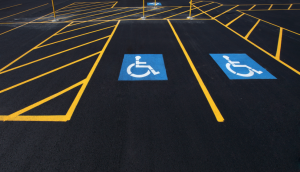08 Dec The Difference Between an ADA-Compliant and a Code-Compliant Orlando Parking Lot: Insights from an Orlando ADA Compliant Parking Lot Paving Company
 The ADA, or Americans with Disabilities Act, was signed into law on July 26, 1990, but some parts of the legislation can be confusing up to this day. The legislation seeks to extend protection from discrimination to persons with disabilities. The ADA also requires an active participation on the part of employers and public officials by setting out guidelines for certain accessibility standards, which we will discuss below.
The ADA, or Americans with Disabilities Act, was signed into law on July 26, 1990, but some parts of the legislation can be confusing up to this day. The legislation seeks to extend protection from discrimination to persons with disabilities. The ADA also requires an active participation on the part of employers and public officials by setting out guidelines for certain accessibility standards, which we will discuss below.
The Confusion Between ADA and Code Compliance
You will often hear the terms ADA-compliant and building code-compliant being used interchangeably. However, there is a world of difference between the two terms. ADA is a nationwide set of standards that has been established at the federal level, while building code requirements are set at the state and municipal level, and they may have certain guidelines in place that go beyond those set by the ADA (which can be found in their most current form in the 2010 ADA Standards for Accessible Design document). This means that even if you have an asphalt installation that is in compliance with the ADA, you may still fall short of the standards set by your local governance.
To best illustrate this, we can take a look at the signage requirements in different states. In Florida, for example, the signs should read “Parking by Disabled Permit Only”, while in Pennsylvania, the guidelines state that the signs should read “Handicapped Parking – Permit Required”. To make it even more complicated, there are many states that actually prohibit the word “handicapped” from being used on signage.
So, what is the easiest solution for you as a business owner? To hire a contractor that is very familiar with both ADA and local regulation. This contractor will have the experience needed to bring your property up to standards. Otherwise, you will have to navigate the legislative maze of your area and check in with various local and state authorities.
The Requirements for ADA-compliance
Since ADA guidelines are set at a federal level, it is easy to understand the requirements for compliance in your area, as they are the same in every state. As mentioned previously, you can check out the official document for a thorough understanding, and in the section below, we will give you a rough outline. We have also covered the ADA regulations on our blog in more detail.
To start, the ADA addresses the number of accessible parking spaces required in relation to the overall number of spaces within your parking lot. For example, if you have less than 25 spaces on your lot, one of them must be accessible, even if you only have one parking space. The ratio scales disproportionately—as the parking lot grows larger, the requirements scale down. For example, for every 25 spaces, you will need 1 accessible parking spot; but once you go over 501 spaces, the accessible spots have to be only 2% of the total.
There are also guidelines for the accessible space itself based on vehicle type (e.g. cars, vans). The specifications for access aisles are also detailed, with information regarding their size, slope, connection to other surfaces, texture, and composition (slip-resistant, firm, stable, etc.).
Preparing Your Orlando Parking Lot to Be in Compliance with Your Local, State, and Federal ADA Regulations
As mentioned above, one of the easiest ways to ensure that your parking lot is in compliance with all the relevant ADA legislation is to hire a professional Orlando asphalt paving contractor. At All Asphalt Services, we specialize in asphalt installation, maintenance, and repair, along with making sure that your curbs and parking lot in Orlando are fully ADA compliant. Contact us today to request a free quote!



Sorry, the comment form is closed at this time.